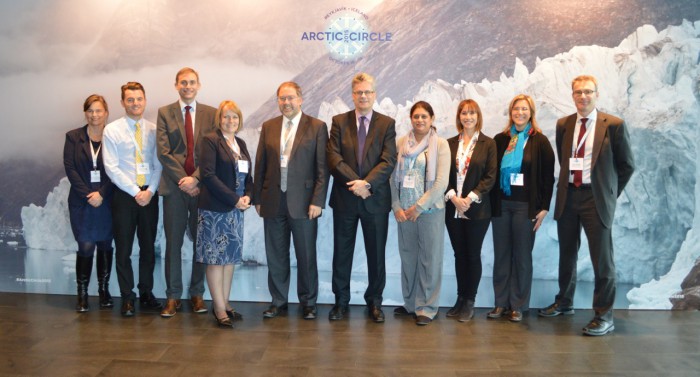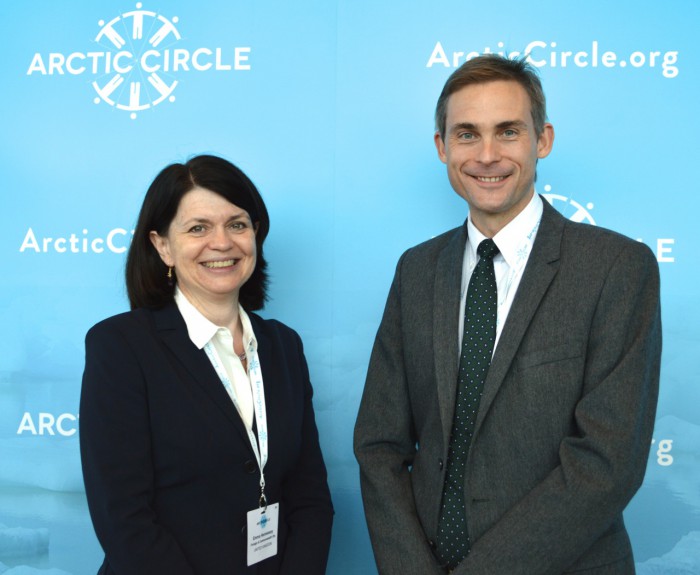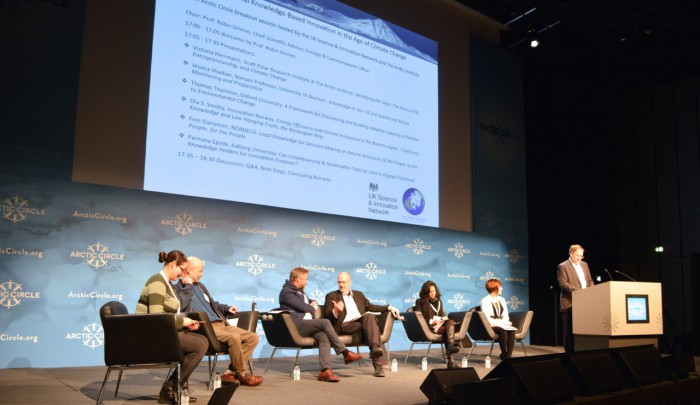13th November 2015 Science and Innovation Network
Arctic Circle: something for everyone?


The vision for the Arctic Circle conference is that it should be an Arctic version of Davos and therefore it caters for a wide variety interests. Despite being only 3 years old, the conference has grown into an event with almost 2000 delegates from around 50 countries, and with representation including princes and presidents! It is now the largest gathering in the world with a focus on the Arctic. The conference, which took place in Reykjavik in mid October, covered a large range of topics: environmental, social, economic and scientific. Discussions included the impact of climate change on the Arctic, the importance of considering the needs of the indigenous people, shipping (opening up the use of the North East Passage), oceanography, sustainable development and the role of science and innovation.
So why is the UK interested in the Arctic given we are located outside the region? The Arctic region has long been a strategic interest to the UK. The speed of climatic change in the Arctic and the associated impacts and opportunities mean that developments in the region will increasingly affect key UK policy interests, which include energy, shipping, fishing, trade, use of resources and the environment. UK’s aims in respect of the Arctic are to: promote peace and good governance, and increase UK influence in the region by maintaining good bilateral and multilateral relationships with the Arctic States and by supporting the work of the Arctic Council and other international and regional bodies; promote wider UK Government objectives with regard to sustainable development, environmental protection and climate change; ensure that if there is any increase in hydrocarbon extraction in the region the UK is well placed to benefit from increased energy security and help promote UK business interests; and ensure appropriate access to fisheries and to transport routes in the region in accordance with international law and agreement.

The UK delegation to the Arctic Circle was headed by Professor Robin Grimes, FCO’s Chief Scientific Adviser, and the focus of our interest was on science and innovation. Robin hosted a session on the use of traditional knowledge in measuring and adapting to climate change which included numerous examples of how indigenous peoples have first-hand knowledge of Arctic changes and how many successful research programmes involve scientists working in tandem with local communities. The Science and Innovation Network (SIN) Nordics team (in particular Daniel Cartridge and Mai Valentin Nielsen) supported and facilitated this event designed to improve collaboration in climate innovation projects. The SIN Nordics team have taken a lead in providing the UK’s contribution to work on the role of indigenous people in the Arctic, and their work has become a key plank of the Government’s Arctic policy, where we are working to combine UK research strength with respectful engagement with Arctic communities, co-creating solutions to global environmental challenges.
Robin also gave a presentation in which he outlined the work of the National Environment Research Council’s (NERC) Arctic Research Programme detailing the role of the UK Arctic Research Station in Ny-Ålesund, Svalbard. NERC is also responsible for the Changing Arctic Ocean Programme, now in its second stage and worth £16 million over 5 years, see here for details. Other key messages on science and innovation included the importance of long-term monitoring to track environmental changes, the use of remote sensing (satellites) to enable year-round monitoring, especially when the weather makes it hard for people to work, and the need for international collaborations.

A changing Arctic presents huge challenges but there were a some innovative solutions too. For example the Icelandic company, Lifriki (www.lifriki.com), has developed a new GPS tagging device for Humpback whales that ‘grows’ with the whale and can therefore be used for much longer periods than standard tags. Lifriki have also worked with a Danish gaming company to develop a series of Apps for school children that can be used to track the migratory patterns of the whales using data from the tags.
The broad range of attendees with scientists, governments and NGOs on the one hand and oil and shipping industry reps on the other meant that speakers during plenary sessions tended not to be challenged, even on areas where countries hold different positions. Is opening up the North East Passage really an environmental success story? What happens if there is an oil spill in this fragile environment? Do we romanticise an ideal of how indigenous people should live, ignoring the hardships and lack of opportunity this requires of them? Can the Arctic environment sustain development?
However, despite the lack of challenge in the plenary sessions, there were lots of breakout workshops, and plenty of opportunities to engage outside the formal meeting and it was here that a lot of the real work could happen. Whether it is indeed an Arctic Davos, dates have been confirmed for the next three years and it seems the Arctic Circle is here to stay.
